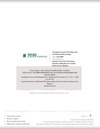Please use this identifier to cite or link to this item:
https://accedacris.ulpgc.es/jspui/handle/10553/74982
| DC Field | Value | Language |
|---|---|---|
| dc.contributor.author | Ponce Espino, Jordi Eusebio | en_US |
| dc.contributor.author | Torrecillas Martín, Ana María | en_US |
| dc.date.accessioned | 2020-10-23T14:45:23Z | - |
| dc.date.available | 2020-10-23T14:45:23Z | - |
| dc.date.issued | 2014 | en_US |
| dc.identifier.issn | 0214-9877 | en_US |
| dc.identifier.other | Dialnet | - |
| dc.identifier.uri | https://accedacris.ulpgc.es/handle/10553/74982 | - |
| dc.description.abstract | This paper presents an investigation whose objective was to conduct a descriptive analysis of the resilience of a group of 100 relatives of people with disabilities. We used a short questionnaire which focused on sociodemographic aspects, and the Spanishversion of the Young and Wagnild Resilience Scale (1993) translated and adapted by Heilemann, Lee, and Kury (2003). Some results indicate that brothers are those who show a higher rate of cases with a higher level of resilience, followed by mothers and then fathers; resilience levels are higher in younger relatives and lower in older ones; mothers bear the burden of care for the dependent member, and there is a significant correlation between the educational level and the level of resilience. | en_US |
| dc.description.abstract | El presente trabajo recoge una investigación cuyo objetivo fue realizar un análisis descriptivo de la resiliencia de un grupo de 100 familiares de personas con discapacidad. Se utilizó, un breve cuestionario centrado en aspectos sociodemográficos, y se empleó la Escala de Resiliencia de Wagnild y Young (1993), adaptada en versión española por Heilemann, Lee y Kury (2003). Algunos resultados indican que son los hermanos los que muestran un mayor índice de casos con un alto nivel de resiliencia, seguido de las madres y luego, de los padres; que la resiliencia es mayor en los familiares más jóvenes y menor en los familiares de más edad; que son las madres las que llevan la carga de la atención al familiar dependiente y que existe una correlación significativa entre el nivel formativo y el nivel de resiliencia. | en_US |
| dc.language | spa | en_US |
| dc.relation.ispartof | INFAD | en_US |
| dc.source | International Journal of Developmental and Educational Psychology: INFAD. Revista de Psicología [ISSN 0214-9877], v. 7 (1), p. 407-416 | en_US |
| dc.subject | 61 Psicología | en_US |
| dc.subject.other | Family | en_US |
| dc.subject.other | Disability | en_US |
| dc.subject.other | Resilience | en_US |
| dc.subject.other | Vulnerability | en_US |
| dc.subject.other | Risk | en_US |
| dc.subject.other | Protection | en_US |
| dc.subject.other | Familiares | en_US |
| dc.subject.other | Discapacidad | en_US |
| dc.subject.other | Resiliencia | en_US |
| dc.subject.other | Vulnerabilidad | en_US |
| dc.subject.other | Riesgo | en_US |
| dc.subject.other | Protección | en_US |
| dc.title | Estudio de factores resilientes en familiares de personas con discapacidad | en_US |
| dc.type | info:eu-repo/semantics/Article | en_US |
| dc.type | Article | en_US |
| dc.identifier.url | http://dialnet.unirioja.es/servlet/articulo?codigo=6918467 | - |
| dc.description.lastpage | 416 | en_US |
| dc.identifier.issue | 1 | - |
| dc.description.firstpage | 407 | en_US |
| dc.relation.volume | 7 | en_US |
| dc.investigacion | Ciencias de la Salud | en_US |
| dc.type2 | Artículo | en_US |
| dc.contributor.authordialnetid | No ID | - |
| dc.contributor.authordialnetid | 193916 | - |
| dc.identifier.dialnet | 6918467ARTREV | - |
| dc.utils.revision | Sí | en_US |
| dc.identifier.ulpgc | Sí | en_US |
| dc.description.dialnetimpact | 0,0 | |
| dc.description.dialnetq | Q4 | |
| dc.description.erihplus | ERIH PLUS | |
| item.grantfulltext | open | - |
| item.fulltext | Con texto completo | - |
| crisitem.author.fullName | Torrecillas Martín, Ana María | - |
| Appears in Collections: | Artículos | |
Page view(s)
55
checked on Jan 10, 2026
Download(s)
63
checked on Jan 10, 2026
Google ScholarTM
Check
Share
Export metadata
Items in accedaCRIS are protected by copyright, with all rights reserved, unless otherwise indicated.
